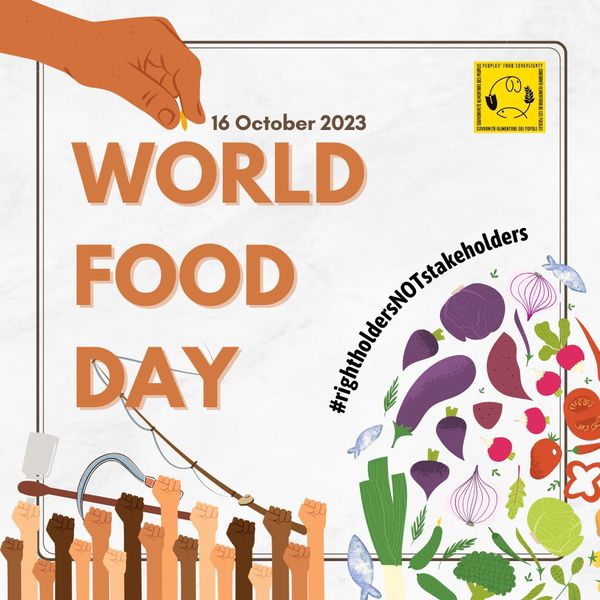Beyond World Food Day

International Planning Committee for Food Sovereignty (IPC) Statement
The World Food Day is an occasion for small-scale food producers’ organizations to celebrate the crucial role of peasant agriculture, family farming, artisanal fisheries, Indigenous Peoples’ food systems, consumers, and all forms of food production that take place on a community and territorial level in feeding the world. Rural and water communities and Indigenous Peoples are rights holders, and their organizations have committed to collective policy dialogue with global institutions through the International Planning Committee for Food Sovereignty since 1996. These dialogues resulted in important milestones and standards for the rights of Indigenous Peoples as well as the rights of small-scale food producers: the International Treaty on Plant Genetic Resources with the concept of Farmers’ Rights; the Voluntary Guidelines on the Tenure of Land (VGGTs) and the Voluntary Guidelines on Small-Scale Fisheries (SSF Guidelines); The UN Declaration on the Right of Peasants (UNDROP) and the Declaration on the Rights of Indigenous Peoples (UNDRIP); the international symposia on Agroecology, the UN Decade of Family Farming, and the UN resolution on Social and Solidarity Economy.
We also ensure the broad and effective participation of small-scale producers, Indigenous Peoples, and social movements in the Committee on World Food Security and Nutrition (CFS), through the Civil Society and Indigenous Peoples Mechanism (CSIPM) and in various FAO processes, upholding the fundamental principles of respecting our autonomy and self-governance.
This has been possible thanks to the fruitful dialogue and negotiations that social movements for food sovereignty, gathered in the International Planning Committee for Food Sovereignty, have been capable of building with FAO and other UN agencies. We consider – today more than ever – the global governance space as an important arena for dialogue among governments, civil society, Indigenous Peoples, and the private sector. Nevertheless, we see this space being weakened but at the same time opened to transnational capital, while we face repression and criminalization for defending our lands and territories from corporate encroachment and ecological destruction which violate our fundamental rights.
We, signatory organizations, would like to express our concern about the World Food Forum (WFF), which seems to sideline the most inclusive global governance spaces for policy dialogue, like CFS and FAO Governing Bodies while strengthening the multistakeholder approach in favor of a wider collaboration with the private sector.
WFF intends to interlink three fora: the Global Youth Forum, the FAO Science and Innovation Forum, and the FAO Hand-in-Hand Investment Forum to combine youth action, innovation, and investments for solutions. Yet, instead of mobilizing resources and attention to contribute to implementing the policies adopted by the UN Committee on World Food Security and FAO, the WFF serves as a space to promote arrangements between corporations and institutions. It offers sponsorship of specific programs by world dominants corporations, with support of few governments, that often push for a corporate-driven narrative ignoring the voice and claims of small-scale food producers’ organizations and Indigenous Peoples.
The IPC is the world’s largest alliance of small-scale food producers, including peasants, fisher people and artisan collectors, pastoralists and herders, nomads, Indigenous Peoples, Ancestral Peoples of marine ecosystems, Indigenous organizations, forest dwellers, landless persons, urban producers, rural workers, and consumers. The IPC gathers more than 6,000 national organizations and 300 million small-scale food producers. Through this platform, they aim to defend the interests of those who supply 70% of global food production and yet, at the same time, continue to suffer from food insecurity, malnutrition, and the non-recognition of their fundamental role in feeding the planet. Those constituencies are represented by specific social movements, Indigenous Peoples, and Civil society organizations (CSOs), both regional and global. Together with consumer movements, support NGOs, and other grassroots organizations, they aim to advance the food sovereignty agenda at the global and regional levels.
“The Guidelines for Ensuring Balanced Representation of Civil Society in FAO Meetings and Processes” and the “FAO Strategy for Partnerships with Civil Society Organizations” have been the basis for cooperation between FAO and Civil Society organizations since 2013. Every FAO initiative should further develop these policies – enhancing the power of multilateralism – along with the principles of self-organization, CSOs’ autonomy, and collective representation through regions and constituencies. This approach will facilitate better communication between small-scale food producers, Indigenous Peoples, and FAO Member States, and International Governmental Organizations. Therefore, we urge FAO Member States to strengthen the global governance spaces and allow CSO and Indigenous Peoples’ representatives to participate and enter a policy dialogue for better solutions.
In this regard, we would like to continue the discussion with FAO, especially with the partnership office and FAO Member States to improve our dialogue and possible collaboration and establish spaces and tools to effectively implement it.
We also reaffirm our commitment to actively engage in the Global Governance processes –including FAO technical Committees, Regional Conferences, and other technical meetings –in respect of the FAO Strategy for Partnership with Civil Society and Indigenous Peoples’ Organizations.
In this context of multiple and intersecting crisis, we need to join our efforts towards the achievement of Food Sovereignty! In our fields, on our seas, in our communities, in our territories, in the choices we make every day as producers and consumers in solidarity, we build the alternatives to the multiple crises that beset our planet.
Signed by
- Habitat International Coalition (HIC)
- URGENCI
- La Via Campesina
- U.S Food Sovereignty Alliance
- Australian Food Sovereignty Alliance (AFSA)
- World Forum of Fisher People (WFFP)
- World Forum of Fish Harvesters & Fish Workers (WFF)
- International Movement of Catholic Agricultural and Rural Youth (MIJARC)
- Movimiento Agroecológico de América Latina y el Caribe (MAELA)
- International Federation of Rural Adult Catholic Movements (FIMARC)
- International Indian Treaty Council (IITC)
- Network of Farmers Organizations and Agricultural Producers of West Africa (ROPPA)
This post is also available in Español.
